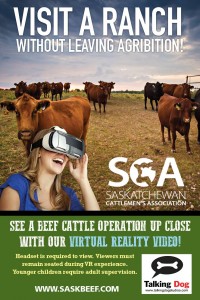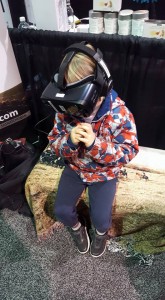While I admit I don’t know a heck of a lot about Augmented and Virtual Reality, I made an instant connection to something I heard a lot about last week when the Canadian Western Agribition was in town, a Virtual Reality experience offered by the Saskatchewan Cattlemen’s Association, aptly titled “On the Ranch”. I give the SCA credit, they capitalized on the huge Agribition crowds to give people a sense of what actually happens on cattle ranches in our province. The idea behind this was to promote agriculture by getting people on to a ranch (virtually of course). Growing up on a large cattle ranch, I initially didn’t give it much thought. But when I went to Agribition, I realized how different my perspective would be if I hadn’t had the personal experience I do. This virtual reality technology was actually allowing people to experience something they would otherwise not have a chance to. The SCA released this “teaser” video at the beginning of November to get people excited.
The SCA’s Virtural Reality experience garnered a lot of attention, including Facebook posts, Twitter mentions, and a Regina Leader-Post article titled, “A bit of the farm in the city at Agribition“. The following quotes are taken from the article:
“To show people that have never been on a ranch … give them an idea of what it’s like to be right with the cattle,” said Garret Hill, a board member with the SCA.
“It’s kind of some new technology that we can take to the urban people to show them what goes in a little bit of our life.”
Now, I must admit that I did chuckle at the line, “It’s kind of some new technology”, which indicates to me that the cattle rancher (whom I know personally) didn’t actually understand the technology, only that it would somehow help to give people a better understanding of life on the ranch. From the SCA’s Facebook page, I found pictures of people, old and young, enjoying the show.
The SCA worked with Talking Dog Studios, who are local Virtual and Augmented Reality experts. Talking Dog Studios are also responsible for the RCMP Musical Ride Virtual Reality experience. An interesting video about how this video was created is shown below.
The SCA’s use of virtual reality to promote agriculture is a timely, local example of the benefits of technology for experiential learning. Was anyone able to try out “On the Ranch”? Thoughts?



What a great connection Heidi! I know that this experience would be VERY valuable for many of my students, but especially some of my EAL learners that are not familiar with animals that would be found on a ranch in Saskatchewan. I am continuously shocked at how many of my students have no idea where there food is coming from and I think using VR would be an incredible tool to allow students to make a meaningful connection. Thanks for sharing!
That’s a great example Heidi. Thanks for giving the name of the company in Regina that produces these. I think our Student Recruitment department should use VR or AR technology to promote the U of R to new students. I will share this information with them.
Hi Heidi! I am so impressed that the agribition has an element of virtual reality or augmented reality! I didn’t go this year, but I certainly would have been visiting the Saskatchewan Cattlemen’s Association Booth if I had. What a great crossover from an industry like agriculture to one like technology. I also wasn’t aware that the RCMP had a virtual Musical Ride. I guess I am really behind the times when it comes to this kind of Technology. Thanks for sharing this new information!
Such a great idea for helping people feel a sense of what it would be like to be a farmer. I watched the video you shared when planning my Agriculture unit and visit to Agribition! AITC (Agriculture in the Classroom) has a number of great resources to support teaching and learning. Understanding where our food comes from is important!